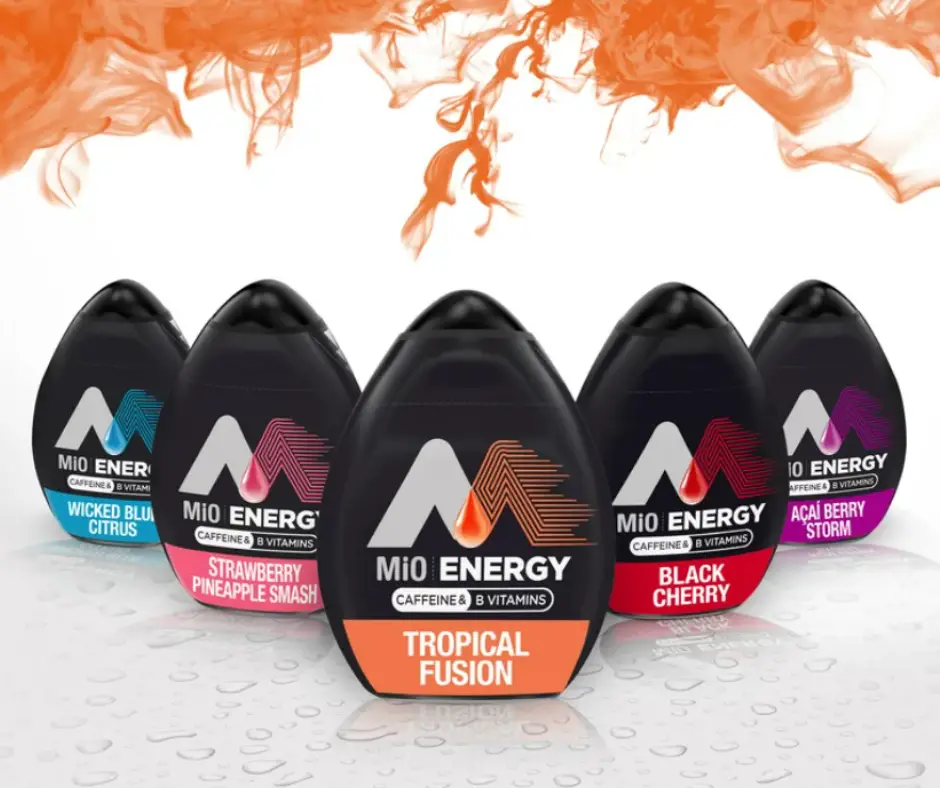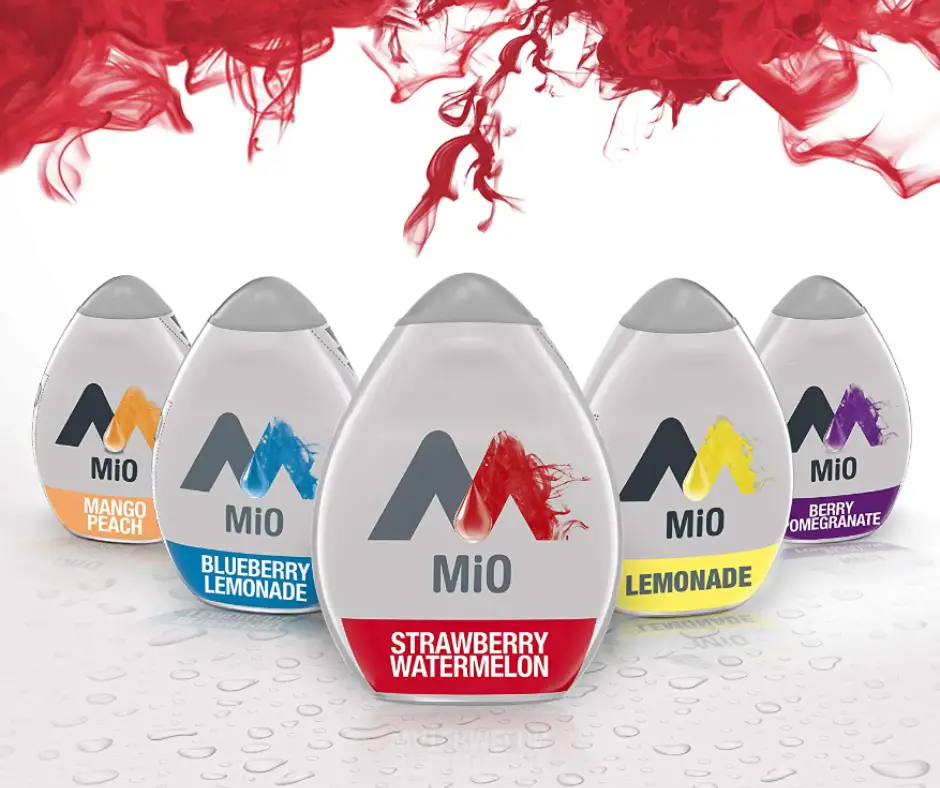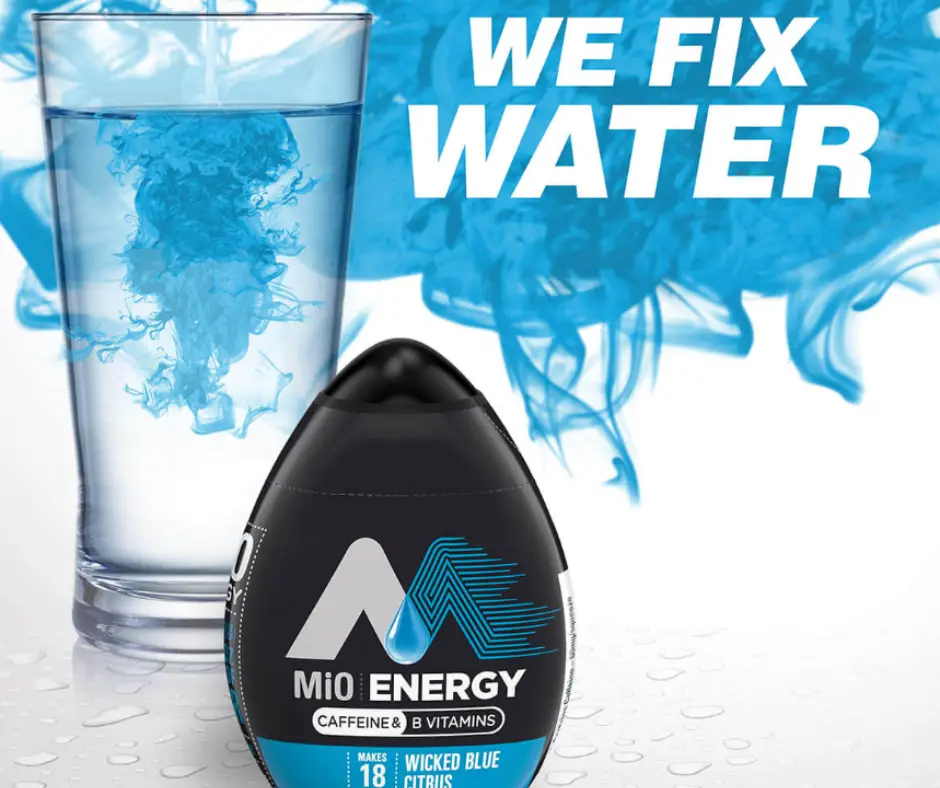Water enhancers have gained popularity in recent years as a convenient and flavorful way to enhance the taste of plain water. MiO is one such water enhancer that has become a household name. It offers a range of flavors that allow users to create their personalized beverage without adding calories or sugar. However, with the rise in usage, concerns have been raised about the potential health effects of using MiO regularly. This blog post will explore the question, Is MiO bad for you? And examine the ingredients and risks associated with its consumption.
The Popularity Of Water Enhancers Like Mio

Water enhancers like MiO have gained a significant following due to their convenience and ability to add flavor to water. The appeal lies in that they can transform plain water into a refreshing beverage without sugary or artificially flavored drinks. MiO’s compact and portable design makes it easy to carry around and use. It has become a go-to choice for those who want to stay hydrated while enjoying a burst of flavor.
The Question Of Whether Mio Is Bad For Your Health
The question of ‘Is Mio Bad For You?’ is a valid concern. While MiO is calorie-free and does not contain sugar, it is important to examine the ingredients used in the product and their potential health effects. MiO contains artificial sweeteners such as acesulfame potassium (Ace-K) and sucralose. Despite being approved by regulatory bodies, some studies have raised concerns about the long-term effects of these sweeteners on gut health and metabolic function. Additionally, MiO contains preservatives and other additives that could pose risks if consumed in excess.
It is important to note that the occasional use of MiO is unlikely to cause significant harm. However, excessive water enhancers like MiO consumption could lead to overconsumption and potential dehydration if they replace plain water intake. It is always recommended to prioritize hydration with plain water and consider flavored options like MiO as an occasional treat.
In the next section, we will delve deeper into the ingredients of MiO and discuss their potential health effects. Stay tuned to learn more about the risks associated with using MiO regularly and how you can make informed choices about water enhancers.
What Is Mio?
MiO is a popular liquid water enhancer that allows users to customize the flavor of plain water without adding sugar or calories. The Kraft Heinz food company manufactures it in various flavors and product lines.
Overview Of Mio As A Liquid Water Enhancer
MiO is a concentrated liquid that is meant to be diluted with water. Each bottle of MiO contains just 1.62 ounces (48 mL) but provides several servings, depending on the product. It is a convenient and cost-effective way to increase your daily water intake, especially if you find plain water unappetizing.
One serving of MiO is equivalent to 1/2 teaspoon (2 mL) and can flavor 8 ounces (237 mL) of water. It is important to dilute MiO and not drink it directly from the bottle. MiO can be mixed with any flavors you like but should not be mixed with alcohol. It is recommended to use MiO within 30 days of opening and to avoid leaving it in a hot environment, as excessive heat can affect its quality. However, it does not need to be refrigerated.
MiO can be taken on the go and is especially convenient for travel due to its spill-proof lid and compact size. It is also environmentally friendly, as the bottle is recyclable.
Different Product Lines And Flavors
MiO offers different product lines, each with its unique flavors and features. Here are the main MiO product lines:
- MiO Original: This line adds flavor to your drinking water without adding calories or sugar. It comes in various flavors, including black cherry, lemonade, and fruit punch.
- MiO Energy: As the name suggests, this product line contains about 60 mg of caffeine per serving. It is designed to provide a boost of energy while still offering customizable flavors. Some flavors in this line also contain other ingredients like taurine and guarana.
- MiO Vitamins: This line is marketed as a healthy replacement for sugary drinks. It contains 10% of your daily needs of vitamins B3, B6, and B12 per serving. Most flavors in this line are sweetened with artificial sweeteners, but a select few are naturally sweetened with stevia leaf extract.
- MiO Electrolytes: This product line is marketed as a sports drink containing sodium and potassium electrolytes. It is designed to help replenish these minerals during physical activity.
Overall, MiO is a versatile and convenient option for those who want to add flavor to their water without the added sugars and calories. However, it is important to note that individual preferences and dietary considerations should be considered when determining if MiO is suitable.

Ingredients Of Mio
When determining Is Mio Bad For You? It’s important to look closely at its ingredients. MiO contains various ingredients, including artificial sweeteners, natural sweeteners, and other additives. Here’s a breakdown of the ingredients found in MiO:
Artificial Sweeteners Used In Mio (ace-k, Sucralose)
- Acesulfame Potassium (Ace-K): Ace-K is an artificial sweetener commonly used in food and beverages as a sugar substitute. While the FDA generally recognizes it as safe, some concerns have been about its long-term effects, including its impact on weight gain and gut microbiome.
- Sucralose: Sucralose is another artificial sweetener used in MiO. It is a low-calorie sweetener that is about 600 times sweeter than sugar. While it is considered safe for consumption, there have been some studies that suggest sucralose may have an impact on blood sugar levels and insulin response.
Natural Sweetener Used In Some Mio Flavors (stevia)
- Stevia: Some flavors of MiO use stevia as a natural sweetener. Stevia is derived from the leaves of the Stevia rebaudiana plant and is known for its high sweetness without adding calories. It is generally considered safe and does not have the same health concerns as artificial sweeteners.
Other Ingredients Like Artificial Food Dyes And Preservatives
- Artificial Food Dyes: MiO may contain artificial food dyes to enhance its appearance and appeal. These dyes have been linked to potential health risks; some studies suggest they may be carcinogenic. It’s important to note that not all flavors of MiO contain artificial food dyes.
- Preservatives: Some flavors of MiO may also contain preservatives to extend their shelf life. Preservatives like potassium sorbate have been associated with negative effects on memory and coordination.
It’s worth noting that while the FDA considers the ingredients used in MiO to be generally recognized as safe, there are ongoing debates and studies on the potential long-term health effects of artificial sweeteners and other additives used in such products.
To make an informed decision about whether to consume MiO, it’s important to consider your health concerns and preferences. If you have specific health conditions or sensitivity to artificial sweeteners, it may be best to consult a healthcare professional before incorporating MiO into your diet.
For those who prefer natural alternatives, there are also options available on the market that use natural ingredients and avoid artificial additives.

Potential Health Effects
Regarding ‘Is Mio Bad For You?’, it’s important to consider a few factors. While these products may provide a convenient way to flavor your water without adding sugar or calories, there are still some concerns and controversies surrounding the ingredients used.
Research On Artificial Sweeteners And Their Impact On Blood Sugar And Insulin Levels
Artificial sweeteners, such as those found in MiO, have been the subject of numerous studies investigating their effects on blood sugar and insulin levels. Some research suggests that these sweeteners can alter blood glucose and insulin levels, contradicting the initial belief that they would have no impact.
For example, in animal and human studies, one study found that sucralose, an artificial sweetener used in MiO, partially digested and altered blood glucose and insulin levels. Another study suggested that sucralose may have weak mutagenic properties, potentially increasing the risk of DNA mutations and cancer in the body. However, further long-term human research is needed to fully understand these findings’ implications.
Controversies And Studies Surrounding The Safety Of Artificial Sweeteners
Artificial sweeteners like those in MiO have been the subject of ongoing controversies and debates regarding their safety. While some studies have shown that these sweeteners are generally recognized as safe by regulatory agencies like the FDA, there are still concerns about their environmental impact and potential health risks.
For instance, a 2020 review found that acesulfame potassium (Ace-K), one of the sweeteners used in MiO, can remain in the environment for a long time and may pose a low threat to aquatic life. Additionally, Ace-K has been shown to increase weight gain in male mice and disrupt the gut microbiome. However, more research is needed to determine if these effects translate to humans.
Potential Health Risks Associated With Artificial Food Dyes And Preservatives
In addition to artificial sweeteners, MiO, and other water enhancers may contain artificial food dyes and preservatives. These additives have also been a topic of concern, as some studies have found potential links to hyperactivity in children and various health issues.
While the safety of these additives is still under debate, it’s important to note that MiO offers some flavors naturally sweetened with stevia leaf extract, a plant-based sweetener. Stevia has shown potential health benefits, such as decreasing appetite and not raising post-meal blood sugar levels.
The potential health effects of MiO and other similar water enhancers are still under investigation. Considering the available research and deciding based on your health concerns and preferences is important. If you use MiO, opting for the versions sweetened with stevia may pose the lowest risks.
Read more:
Is Mio Beneficial?
Increasing Water Intake With Mio
MiO liquid water enhancers can be a convenient and flavorful way to increase your water intake. Adding a burst of flavor to your plain water, MiO can make drinking more enjoyable and help you stay hydrated throughout the day. For individuals who struggle to drink enough water, using MiO can be a helpful tool in maintaining proper hydration levels.
Comparing Mio To Natural Alternatives For Flavoring Water
While MiO can be a convenient option for flavoring water, natural alternatives can provide similar benefits without using artificial sweeteners and additives. Here are some natural alternatives to consider:
- Fresh fruit slices (such as lemon, lime, or orange) can add a refreshing flavor to your water without additional sugars or artificial ingredients.
- Herbs like mint, basil, or rosemary can add a subtle and aromatic taste to your water.
- Infused water pitchers or bottles with built-in fruit infusers can easily incorporate natural flavors into your water.
These natural alternatives provide a healthy and refreshing way to flavor your water while avoiding any potential negative effects of artificial sweeteners or other additives. Plus, they offer the added benefit of additional nutrients from the fruits or herbs used.
In conclusion, MiO can be a beneficial tool for increasing water intake and making hydration more enjoyable. However, it’s important to be mindful of the ingredients and choose options that align with your health goals. Exploring natural alternatives can provide a more wholesome and nourishing way to flavor your water. Always prioritize your overall health and make choices that support your well-being.
FAQ: Is MiO bad for you?
Q: What is MiO?
A: MiO is a liquid water enhancer that the Kraft Heinz food company manufactures. It is designed to add flavor to plain water and comes in various flavors and product lines.
Q: Does MiO contain artificial sweeteners?
A: Most MiO products contain artificial sweeteners such as acesulfame potassium (Ace-K) and sucralose. These sweeteners have been shown to affect blood sugar and insulin levels and may have potential health risks.
Q: Are there any natural sweeteners used in MiO?
A: Some flavors of MiO Vitamins are naturally sweetened with stevia leaf extract, which is a plant-based sweetener. However, the majority of MiO products use artificial sweeteners.
Q: Are there any health concerns associated with MiO?
A: Yes, some potential side effects and health concerns are associated with the ingredients found in MiO products. These include artificial sweeteners, synthetic dyes, and preservatives.
Q: Can MiO help increase water intake?
A: MiO can help increase water intake for individuals who struggle to drink enough plain water. It is a concentrated liquid that is meant to be diluted with at least eight ounces of water.
Q: Are there any alternatives to MiO for flavoring water?
A: There are natural alternatives to flavoring water without artificial sweeteners, such as adding fruits or herbs to your water. You can try infusing your water with fruits like lemon or berries or herbs like mint or basil.
Q: Is MiO calorie-free?
A: MiO is calorie-free, so you can enjoy it without worrying about excess calories or weight gain.
Q: Is MiO safe to consume?
A: MiO is considered safe to consume by the Food and Drug Administration (FDA). However, it’s important to consider your own dietary needs and health concerns when deciding if MiO is a healthy addition to your lifestyle.
Q: How long can I keep an open bottle of MiO?
A: MiO does not require refrigeration but should be used within 30 days of opening. Make sure to store it in a cool, dry place.
Q: Can pregnant or breastfeeding women consume MiO?
A: It is recommended to consult with a doctor before consuming MiO if you are pregnant or breastfeeding to ensure it is safe for you and your baby.
Please note: The information provided above is for informational purposes only and should not be considered as medical advice. It is always best to consult a healthcare professional regarding your health needs and concerns.
Conclusion
Now you should know the answer to ‘Is Mio Bad For You?’. After examining the data and research surrounding MiO, it is clear that there are mixed opinions about its impact on health. Here is a summary of the key findings:
- MiO is a liquid water enhancer that allows users to flavor their water without adding sugar or calories. It comes in various flavors and is available in four product lines: Original, Electrolytes, Vitamins, and Energy.
- Most MiO products contain artificial sweeteners such as acesulfame potassium (Ace-K) and sucralose. These sweeteners are generally recognized as safe by the FDA, but their long-term effects are still being studied.
- MiO Energy is the only product line that contains caffeine, while the others are caffeine-free. Caffeine can have positive and negative effects on the body, so it is important to consume it in moderation.
- MiO can help increase fluid intake and reduce the risk of dehydration, especially for those who struggle to drink plain water. It is a convenient and cost-effective option to flavor water and encourage hydration.
- Some studies and reports have raised concerns about the environmental impact of artificial sweeteners like Ace-K and the potential negative effects on health. However, more research is needed to understand their implications fully.
Considerations For Incorporating Mio Into Your Lifestyle
If you are considering incorporating MiO into your lifestyle, here are a few things to keep in mind:
- MiO should be used as a flavor enhancer, not as a water substitute. Drinking an adequate amount of plain water is important to stay hydrated.
- Use MiO in moderation and be mindful of your overall sugar and calorie intake. While MiO is sugar-free and calorie-free, it is still important to maintain a balanced diet.
- If you have any existing health conditions or concerns, it is recommended to consult with a healthcare professional before using MiO or any water enhancers.
- There are natural alternatives to flavor water, such as infusing it with fruit or herbs. These options provide a flavorful and healthy way to enjoy the water without artificial additives.
Overall, MiO can be a convenient and enjoyable way to enhance the taste of your water. However, it is important to use it in moderation and consider the potential impacts on your health and the environment. As with any dietary decision, making informed choices that align with your needs and preferences is best.
References:

James Robinson loves coffee and blogging all about coffee. His blog is full of informative posts about the best ways to enjoy coffee and the many different types of coffee out there. He also shares recipes for delicious coffee-based dishes, and his followers can always count on him to offer tips on how to improve their coffee-making skills.

